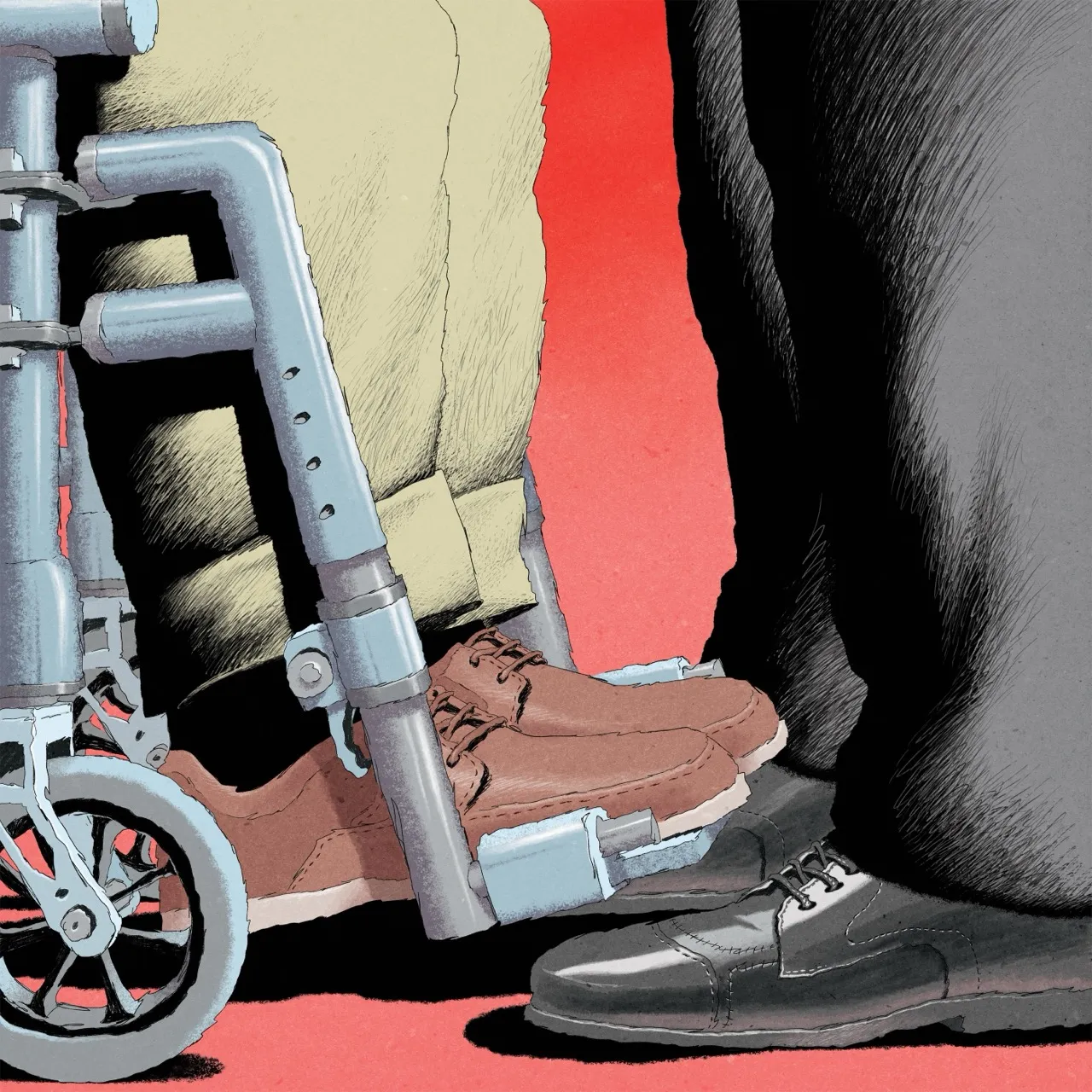Throughout my 14 years as the Reformed Church in America’s coordinator for Disability Concerns, I sought to specifically include and name disability in any conversations connected to diversity, equity, and inclusion (DEI), because people with disabilities were usually overlooked in such discussions.
When I would gently challenge consultants leading diversity workshops for not naming disability, they were apologetic. They said that, of course, people in the disability community deserved to be included with other marginalized groups (people of color, women, LGBTQ+), but then those same consultants struggled in their efforts to add disability to their presentations. This ongoing failure to even name disability in DEI conversations has led many disability groups to revise DEI to DEIA (Disability, Equity, Inclusion, and Accessibility).
Even though it’s felt like few have been paying attention to these efforts, the Trump Administration was. On January 20, following President Trump’s inauguration, an anti-DEI executive order, “Ending Radical and Wasteful Government DEI Programs and Preferencing,” was issued. It threatens to eliminate basic accessibility for people who live with disabilities and includes sections like this one:
The Director of the Office of Management and Budget (OMB), assisted by the Attorney General and the Director of the Office of Personnel Management (OPM), shall coordinate the termination of all discriminatory programs, including illegal DEI and “diversity, equity, inclusion, and accessibility” (DEIA) mandates, policies, programs, preferences, and activities in the Federal Government, under whatever name they appear. … Federal employment practices, including Federal employee performance reviews, shall reward individual initiative, skills, performance, and hard work and shall not under any circumstances consider DEI or DEIA factors, goals, policies, mandates, or requirements.
Among other actions in the first week of the Trump presidency, the “Accessibility” page and all American Sign Language (ASL) content was removed from the White House website. ASL interpreters are no longer included at emergency press briefings. The Department of Justice Civil Rights Division was frozen “until further notice”; this office is responsible for fielding complaints and cases to protect against discrimination based on race, sex, gender, class, age, religion, disability, national origin, and more. It is also one of the main mechanisms for enforcing the Americans with Disabilities Act (ADA) and Section 504 of the Rehabilitation Act.

No doubt you’ve heard of the ADA, but Section 504 of the Rehabilitation Act may not be as familiar. Early in the COVID-19 pandemic, the Netflix documentary Crip Camp: A Disability Revolution was released and energized many of us in the disability community with dramatic footage of the Section 504 protests in the 1970s and the challenges in the 1980s to get the ADA passed in 1990. The initial implementation of Section 504 was driven by significant advocacy, including the 26-day San Francisco sit-in by disabled advocates in 1977, which was the longest occupation of a federal building at the time.
Section 504 prohibits discrimination against qualified individuals with disabilities in any program or activity receiving federal financial assistance. It ensures that people with disabilities have equal access to educational opportunities and other services by requiring organizations to provide reasonable accommodations and modifications, such as physical accessibility, effective communication aids, and other services to ensure equal opportunity. It was one of the first U.S. federal civil rights laws offering protection for people with disabilities. Section 504 was updated in 2024 to clarify and strengthen protections against disability discrimination in federally funded health programs.
Each federal agency is responsible for enforcing its own regulations under Section 504. But on May 16, 2025, the U.S. Department of Energy (DOE) used what’s known as a direct final rule to announce it was rescinding a rule that’s been on the books since the 1970s requiring any building receiving federal funds, whether for new construction or undergoing renovation, to be made accessible. DOE said the Section 504 rule, which was written by the then-Department of Health, Education and Welfare and incorporated by Congress into the Rehabilitation Act of 1973, is unnecessary because of other federal requirements, so it was fast-tracking the rule rescission.
Given the general prohibition on discriminatory activities and related penalties … DOE finds these additional provisions unnecessary and unduly burdensome,” the agency said in the preamble to the rule rescission. “It is DOE’s policy to give private entities flexibility to comply with the law in the manner they deem most efficient.
The agency intended to make the rescission effective July 15 but pushed the date back to September 12 after it received more than 20,000 comments, a significant number of which protested the action. Disability-rights advocates say the agency is misusing the fast-track process. The Disability Rights Education and Defense Fund (DREDF) and other disability rights organizations opposed the move, arguing the rules are crucial for ensuring inclusion and access, and that their elimination is a direct attack on civil rights.

The Center for Public Representation concluded that eliminating the protections of the rules “will undermine one of the primary purposes of Section 504 by encouraging new construction and alterations that are not accessible to people with disabilities. It will also create confusion, additional work and expense, and potential liability for recipient entities.” Because the Section 504 regulations reflect a careful compromise approved by Congress and have been in effect for almost 50 years, legally they cannot be simply nullified by the DOE.
DREDF officials contend that if the Trump Administration is successful, this hasty approach may be used to modify more of the 80-plus sets of Section 504 regulations across the federal government. The DOE change could affect thousands of buildings that are part of state and local government, universities, and elsewhere that receive funding from the agency. Existing regulations require facilities constructed or altered after June 13, 1980, that receive federal financial assistance to be “readily accessible to and useable by handicapped persons.”

Trump’s second term has included numerous orders threatening or nullifying advances of the Disability Rights Movement that have taken decades to achieve. A September 16 article in The New Yorker (“Donald Trump’s Assault on Disability Rights”) details how federal offices and programs that insure equal treatment are being shuttered and scaled back.
Besides The New Yorker article, here’s a sampling of other headlines I’ve been tracking just since August:
- Trump Administration to Reconsider Disability Regulations for Airlines
- Trump Plan Would Limit Disability Benefits for Older Americans
- Autism Advocates Blast Trump Administration Announcement as ‘Dehumanizing’
- Education Department Halts Funds to Programs for Deafblind Students Over DEI Concerns
- Parents Fear Losing Disability Protections as Trump Slashes Civil Rights Office
- CDC Temporarily Revokes Remote Work Approvals for Employees with Disabilities
- Trump’s Promise to End Vote-by-Mail Is Yet Another Attack on Disabled Voters
- Ed Department Preparing to Cut Millions in Special Education Funding, Advocates Warn
As these erosions to disability rights trickle down, many states with large MAGA bases are following suit in budget allocations. In Being Heumann: An Unrepentant Memoir of a Disability Rights Activist (2020), the late Judy Heumann writes, “When laws and policies get less visible, it becomes more and more difficult to know whether an action is even considered a violation of your civil rights.”
Standing up to the Trump Administration’s attacks is daunting. As The New Yorker article spells out, the President’s disdain for people with disabilities is well documented. Amid my despair, I found a glimmer of support and encouragement in a line from my church’s World Communion thanksgiving liturgy last Sunday:
Bless the Lord, for we have been strengthened to stand with the oppressed.
Thanks be to God, the God of justice.
Would most Christians in the United States today agree that we worship a God of justice, one who calls on us to stand with the oppressed?
I fail to understand how people of faith, especially our elected officials, can support these attacks on the civil rights of people with disabilities, which erode community and any hope of self-directed lives. Certainly, there is no Christian faith perspective to support the Trump Administration’s policies that I’ve mentioned. If an argument about cost or efficiency is made, then, for consistency’s sake, let’s be honest and say that people with disabilities represent wasteful spending and are not worth inclusion.


14 Responses
Thanks for this, Terry. This is another essential lens to be utilized. I find myself analyzing this from a big-picture perspective.
This is a battle of worldviews:
On the one hand, we have a biblical, kingdom-of-God worldview. We love our neighbor, we share “our” wealth, we care for the widow, the sojourner, the sick, the oppressed. We forgive, we seek peace, we tell the truth, we champion humility and unity. We commit to mutuality, a balance-of-power. We believe in covenanting and we tolerate other views.
On the other hand, there is a movement defining all of this to be “woke.” Love your neighbor? Care for the oppressed? Keep your word? Love, joy, peace, patience, kindness, goodness, faithfulness, gentleness, self-control? These are not just to be ignored. They must be MOCKED!! Disability accommodations are an inconvenient interruption to the movement’s narrative. And they are expensive, particularly within a framework prioritizing dollars and cents above all else. Disease? Climate? Rule of law? Respect for women? Trade balance? Bottom line here: WE DO NOT CARE! Might makes right.
In summary, there is nothing partisan here. This is an intentional dismantling of the teachings of Jesus, often supported by evangelical leaders. Oh, one more consideration bears mentioning…Yes, we must respect life, including the lives of the unborn. But we have long ago passed the threshold where this one group of lives supercedes all others, including the balance of world power/peace/health. And let us not forget that totalitarian governments are the ones who FORCE abortions, not democratic ones. Dictatorships have minds of their own.
Thanks, Terry, for your fine overview of this issue. In addition to rolling back federal accessibility standards which affect individuals with physical and sensory disabilities, the Trump Administration is targeting programs that help individuals with intellectual and developmental disabilities (like my son David) life full lives in the community. Medicaid cuts threaten the fragile social care system (that pays for group homes and day activity centers) which is already stretched thin. The Administration wants to zero out funding for federally-mandated Protection and Advocacy agencies, state Councils on Developmental Disabilities, the Lifespan Respite program and University Centers for Excellence in Developmental Disabilities. These programs help students with disabilities access school services, investigate abuse and neglect in private and state-run facilities, research and communicate best practices and much more. The Department of Education is being dismantled, which will disproportionately affect students with disabilities. Mass layoffs approved by the Supreme Court means that special education students will have difficulty accessing federally-mandated supports and services required by the Individuals with Disabilities Education Act and Section 504. All atrocious. All unjust. All un-Christian.
Thank you, Terry, for your straightforward articulation of this nightmare of regression in accessibility whose full force is yet to be felt. This article is a gut check to those of us who advocate and support family members, or ourselves, with regard to disabilities. How do we make a difference and do what we can in the faith and secular spaces we are in? Somewhat of a rhetorical question but I’m open to suggestions and personally need to do more.
Thanks for highlighting this issue and the erosion of protections and accommodations for so many people. It continues to amaze me how unkind and cruel this administration is towards so many groups of people. I am also always discouraged when so many MAGA supporters go along with it despite the fact that is also affects them and members of their own families, their friends, neighbours and others that need care & consideration, not more cuts. These are difficult and dark days that may call for another sit in, although they may send in the troops to stop it!
I will say, Terry, that Crip Camp is scandalous and will likely offend people.
Camp Jened is NOTHING like Camp Roger or Camp Geneva.
Caveat Lector.
😃😃😃
But it’s a GREAT film.
Here’s how all that translated to classroom management on the ground in the last few years: One of the biggest issues teachers of all kinds have had is dealing with the distractions provided by devices. Once upon a time, such things would have been easy to prohibit: phones, frisbees, all the same, they don’t belong in a classroom. No more.
From the Johns Hopkins University page on “Disabilities”:
“Attention Deficit Hyperactivity Disorder …
Characteristics (may include)
Inability to stay on task
Easily distracted
Poor time management skills
Difficulty in preparing class assignments, keeping appointments, and attending class on time.
Reading comprehension difficulties
Difficulty with math problems requiring changes in action, operation and order
Inability to listen selectively during lectures, resulting in problems with note taking
Lack of organization in work, especially written work and essay questions
Difficulty following directions, listening and concentrating
Blurting out answers
Poor handwriting
Considerations and Instructional Strategies
Effective instructional strategies include providing opportunities for students to learn using visual, auditory and hands-on approaches.”
What that meant was things like students claiming they needed to play games on their phones during class because “that’s how I manage my ADHD,” and demands that instructional methods “accommodate” their needs. Both these demands get framed in “rights” language, and any questioning of the reasonableness of these demands is framed as “denying my rights.” Depending on how single-minded a university disabilities office is about “advocating for students” a professor may find him or herself involved in a rather stressful contest over who is, in fact, running the classroom.
It’s not my intention to deny that there are often real issues here and some very complicated needs and difficulties that require good faith negotiation. But on the ground, the force of law is used as a end-run around all that. Again, depending on the attitudes of the disabilities office, one can find oneself in a situation where it’s that office that’s running your classroom, and not with a goal to provide excellent education for all, but in the service of whatever their ideology dictates.
One can win a lot of battles that way, but still lose the war.
To a large extent, that’s what we’re seeing now. There’s a kind of Newtonian law at work, which says the implementation of force in one direction produces an inevitable reaction that takes the form of force pushing in the opposite direction.
I fully lament almost everything that’s happening under the current epoch in America’s wrestling with these and other questions about policy. But it was far from unpredictable.It’s just the way the world works. Unreason begets unreason.
John, sounds like you have thrown up your hands and going the settled for least common denominator route
Sorry for you living with out faith and in a belief that the there is no hope for the future.
“Wise as serpents” never goes out of style, A.
Resending decades of hard fought for laws and regulations benefiting the least mobile among us is another strike against this administration’s claim to be Christian.
Trump, in the case of reversing established law that required built- in accessibility features for new construction and renovation projects for public use, he is seeking revenge on government restrictions on past construction projects that mandated costly structural modifications he saw were superfluous and another added expense to his projects.
On its face, this over ride of regulation standard practice has no basis in law. Public opposition should result in court action.
But, there’s no guarantee that wrongs perpetrated by the party currently in power will not meet justice for this action, as well as the other multitude of aggressive anti-democracy acts recorded as fact.
Thank you, Terry for some important reminders.
Thanks, Terry—and praying that the workshops at the WCRC General Council will yield advocacy and better inclusion—thank you so much for your work in this project. And a personal thank you from Lindsay’s mom 😉.
Thank you so much, Terry, for this timely overview and assessment. Your unrelenting advocacy is so vitally important to our society today, and especially it’s leadership. Keep up your good work, and keep talking! Methinks you haven’t really “retired”, Terry, and thanks be to God!
Thank you Terry!
I greatly appreciate your presence in mind, body and spirit.